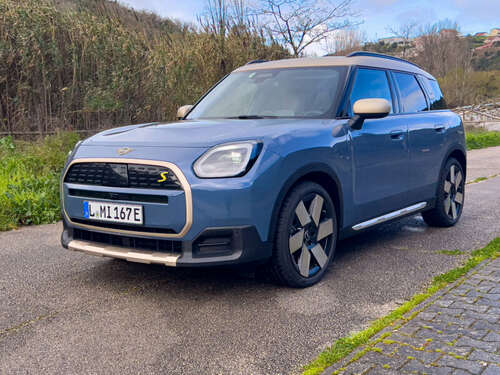
Jonathan Gitlin
Over the last couple of weeks, we’ve brought you test drives of a pair of related small cars, the 2024 BMW X2 M35i and the 2025 Mini JCW Countryman. Today it’s time for the third member of the family destined for US sales, and the one that we think Ars readers will be most interested in—the fully electric Mini Countryman SE ALL4.
This is the third-generation Mini Countryman, replacing the plug-in hybrid version we last tested in 2017. It’s a little larger now, although not by much: at 174.5 inches (4,433 mm) long, 72.6 inches (1,843 mm) wide, and 65.2 inches (1,656 mm) tall, it is still a pretty small car by most standards. It’s also a pretty aero-efficient one; the drag coefficient is just 0.26.
As the ALL4 name might suggest, this is an all-wheel drive electric vehicle, with a combined 313 hp (230 kW) and 365 lb-ft (494 Nm), fed by a 66.5 kWh lithium ion traction battery. That makes it nearly as peppy off the line as a Ferrari Testarossa, capable of reaching 62 mph (100 km/h) from a standing start in 5.6 seconds. (The Ferrari took 5.2 seconds to reach 60 mph.) Top speed is limited to 112 mph (180 km/h).
-
The Countryman SE ALL4 should have a range of just under 250 miles.
Jonathan Gitlin -
It really is still quite small
Mini -
Mini has ditched the union flag taillights.
Jonathan Gitlin -
The ride is noticeably better than the gasoline version we drove.
Mini -
Although it’s big for a Mini, it was the perfect size for small Portugese villages.
Mini
Although Mini doesn’t have an official EPA range estimate yet, it thinks the Mini Countryman SE ALL4 should be able to travel about 245 miles (394 km). There’s an onboard AC charger capable of rates up to 22 kW, although you’ll probably only encounter such powerful level 2 chargers in Europe, where they can take advantage of three-phase electricity. DC fast charging tops out at 130 kW, which should take the battery from 10–80 percent state of charge in 30 minutes.
The styling is virtually identical to the JCW Countryman we wrote about a couple of weeks ago. The differences are subtle—a filled-in grille, no quad exhaust pipes (for this is a Mini, not a Dodge), and bronzish-goldish accents here and there. The 20-inch alloy wheels are made from 70 percent recycled aluminum, Mini told us.
The interior uses a different mix of materials than the JCW Countryman, but is has the same layout and the same pluses and minuses. The interior makes heavy use of recycled polyester, which Mini says significantly reduces the carbon emissions of its supply chain and also uses less water than cotton.
There’s the same bright, circular OLED infotainment display with the same user interface that is again hobbled by what feels like an underpowered graphics chip. There are still a smattering of physical controls, and I still think the cubby between the driver and passenger seats could be larger.
On the road, the Mini Countryman SE ALL4 feels noticeably different to drive than the gasoline-powered JCW version. Some of that is down to the steering, which is geared differently to the JCW car and feels slightly less direct. The suspension also contributes to the SE ALL4 feeling differently, as it’s better damped against bumps and jolts—no doubt as a result of having to control a heavier car thanks to the battery pack. (Mini has not given us a curb weight for either JCW or SE ALL4, however.)
-
The inteiror is stylish and tactile.
Jonathan Gitlin -
The augmented reality view for the navigation is very useful on unfamiliar roads.
Jonathan Gitlin -
Spike is rather cute.
Jonathan Gitlin -
This cubby is too small to be very useful.
Mini -
Recyled aluminum for the alloy wheels helps Mini keep the Countryman SE’s carbon footprint as small as possible.
Jonathan Gitlin
Perhaps my highlight of the Countryman SE ALL4 was the synthetic driving sounds it makes in the cabin, which are rather over the top. I’m also quite aware many of our readers will dislike this aural exuberance and will be glad to know that they can be turned off.
Mini says the 2025 Countryman SE ALL4 will be available in the US this fall, starting at $45,200.

